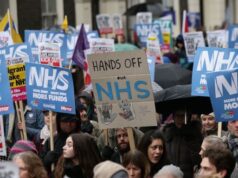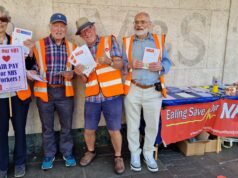Issue: 25
June 2015
This occasional newsletter is researched, written and edited by a group of concerned residents in Ealing, West London who want to preserve our NHS. We view the wholesale engagement of private, for-profit healthcare service suppliers as unnecessary, profligate and dangerous. Process improvement is what is needed in our NHS – not revolution.
Politics and the NHS
I thought the ‘noise’ around supporting the NHS prior to the General Election would now subside, but after a short lull it’s headline news again. Jeremy Hunt MP has been re-appointed as Secretary of State for Health. Most NHS activists fear the worst with the prospect of five years of a Tory Government. We see the spectre of the destruction of the NHS as we know it.
On 18 May 2015 PM Cameron announced his desire to meet his pre-election commitment to a 7 day NHS. He said again that he will inject another £8 billion each year into the NHS, but it’s not clear where that money is coming from. The Royal College of Nursing reacted badly to this and its members could take industrial action if 7 day working impacts unsocial hours and weekend working payments. 51 NHS bosses have also written to Cameron saying that the £8 billion extra is not enough and more is needed for ‘transformation and social care’. Cameron committed again to recruiting 5,000 more GPs by 2020.
In North West London the swing to Labour in the General Election was very striking. Many of us feel that was the result of very active grass roots NHS campaigns. For example there were Labour gains in Central Ealing & Acton, Brent Central and Brentford & Isleworth. There were increased Labour majorities in Ealing North, Ealing Southall, Hammersmith, Harrow West, Feltham & Heston and Brent North.
Ealing is now very much a one party state with all Labour MPs and Labour having a massive majority on Ealing Council. It would be good to see all the MPs, Labour councillors and Ealing Save Our NHS working together to save Ealing Hospital A&E. Other local healthcare battlegrounds on which politicians should fight include saving Clayponds Hospital in South Ealing and saving the Solace mental health walk-in centre in West Ealing.
Now all this assumes that UK Labour and Ealing Labour want to make a priority of fighting changes to the NHS. Maybe the £12 billion cuts in welfare benefits will be a much bigger national Labour priority. As UK Labour is currently headless and direction-less, it’s hard to tell. As for Ealing Labour, with austerity cuts continuing unabated. it might be too pre-occupied with keeping the Ealing Council services ship afloat generally to have much time or money trying to save the local NHS.
Ealing Hospital Maternity to Close on 1 July 2015
At a five hour public meeting on 20 May 2015 held at a ‘remote’ location (Ealing Trailfinders Sports Club, West Ealing) the ECCG finally bit the bullet and publicly sanctioned the closure of the Ealing Hospital Maternity Unit as from 1 July 2015. So as of a few weeks time there will be nowhere across the 21 square miles of Ealing where Ealing women can have their babies delivered in a bespoke, hospital ‘setting’. This closure trashes the recent investment in new birthing facilities at Ealing Hospital. Over 27 years of birthing on the Ealing Hospital site is hereby terminated. The major reason given for the closure is the inability of Ealing Hospital Maternity Unit to meet the London Quality Standards for maternity services. The numbers of women having babies at Ealing Hospital has been falling in recent years – not surprising as the decision to close the maternity unit was first announced in 2012!
50 demonstrators turned up outside the venue. They included mums with babies, Ealing MPs Rupa Huq and Steve Pound, Ealing Save Our NHS, Save Our Hospitals, 38 Degrees and Occupy. Many of them attended the meeting, with over ten asking questions.
Southall mothers-to-be with complex needs will be the hardest hit by this closure. 39% of those who gave birth at Ealing Hospital in 2013/14 live in Southall. In future, pregnant women will have to travel to Hillingdon, West Middlesex, St Mary’s, Queen Charlotte’s & Chelsea, Chelsea & Westminster or Northwick Park Hospitals. Average travel times by bus and car for those living in Southall Broadway will almost double according to the ECCG. ECCG says that by the end of May 2015 extra birthing capacity for up to 3,650 additional births will have been added to the six hospitals. Up to 120 staff will have longer journeys to work given they accept their relocation offers.
We were told at the meeting that the closure had nothing to do with cost cutting. It, apparently, is all about providing a better maternity service across the whole of North West London. My take on this is that meeting Ealing mothers’ needs is being sacrificed for a greater ‘good’.
Ealing Hospital Emergency Gynaecology will also close in July 2015, with Paediatrics closing in July 2016.
Healthwatch Ealing – Ignore It or Support It?
A local Healthwatch is a ‘consumer champion for patients and the public in health and social care’. A local Healthwatch is accountable to its Local Authority and has been since Healthwatch came into operation in April 2013. Local Healthwatch bodies have formal working relationships with the Care Quality Commission (CQC).
Concerns have been voiced all over the country that local Healthwatch bodies are too close to Local Authorities to be independent. The People’s Inquiry into London’s NHS recommended that Healthwatch England be closed down and that local Healthwatch bodies be segregated from the CQC and modelled on the old Community Health Councils.
Healthcare is in turmoil in Ealing. The NHS Shaping a Healthier Future (SaHF) seeks to downgrade Ealing Hospital, rob it of its A&E unit as we know it and close its maternity unit on 1 July 2015. Thousands of Ealing residents have signed petitions and participated in marches, rallies and demos in protest against SaHF. To what extent has Healthwatch Ealing represented the views and concerns of these protesters? On current evidence the answer has to be very little.
Healthwatch Ealing’s Chair was interviewed in public by the Independent Healthcare Commission for North West London on 21 March 2015. There were questions about the impact of SaHF she could not or would not answer. Some of her answers were factually incorrect. It was also revealed that her written submission had not been approved by the Healthwatch Ealing Board! Overall the Healthwatch presentation lacked credibility and was sympathetic to SaHF.
Maybe it’s possible to change Healthwatch Ealing so it does represent the views of patients and residents. In order to bring about change more Ealing residents disaffected by SaHF need to join the organisation and make their views known at Healthwatch Ealing’s AGM on 16 July 2015. BTW funding for Healthwatch Ealing is to be slashed by £100,000 a year beginning on 1 July 2015.
To join Healthwatch Ealing go to:
http://healthwatchealing.co.uk/join_us
SaHF Playing Fast and Loose with the Truth
In a 6 May 2015 email to Peter Latham, SaHF’s Medical Director Dr Mark Spencer gets the facts all wrong in trying to shore up the ailing Shaping a Healthier Future (SaHF) transformation programme for NHS NW London.
Firstly he misquotes the Independent Reconfiguration Panel (IRP) and the Secretary of State (SoS). He states they both forced SaHF’s hand in the urgent closing of Central Middlesex and Hammersmith Hospital’s A&E units ‘as soon as practicable’. The SoS did not ask for urgent closure, but closure ‘as soon as practicable’. As for the IRP it stated that ‘the NHS’s implementation programme must demonstrate that, before each substantial change, the capacity required will be available and safe transition will be assured’. The IRP emphasised the need for and lack of Out of Hospital services. The IRP also did not ask for any urgent closure.
Secondly Dr Spencer states that there is no NHS A&E target for Type-1 patients (the most ill). This is nonsense as there is a target and nationally data is collected for ‘percentage in 4 hours or less (type-1)’. This Type-1 performance in NW London after the two A&E closures has been disastrous. However Dr Spencer shamelessly completely ignores this. As he confirmed at the Independent Healthcare Commission public hearing on 9 May 2015, SaHF likes to consider only performance figures of A&Es and UCCs combined.
Finally, Dr Spencer attempts to rubbish the findings of the Independent Healthcare Commission by labelling it as having ‘pre-formed views’. This really is rich coming from SaHF, as even before SaHF’s public consultation its ‘pre-formed view’ was that four out of nine hospital A&Es in NW London must close.
North West London Independent Healthcare Commission Public Hearing at Brent Civic Centre 9 May 2015: SaHF Supporters in the Spotlight
I listened to three stalwart supporters of SaHF being questioned at this event – Dr Mark Spencer, Dr Mohini Parmar and Ms Ursula Gallagher. Dr Spencer and Ms Gallagher appeared completely unconcerned about the welter of continuous criticism about SaHF. All three of them would not answer any finance related questions. No-one was able to explain why the required, approved business cases for closure were still unavailable three years into the SaHF programme.
Commissioner Dr Stephen Hirst took issue with Dr Spencer about the geographic spread of the proposed five major hospitals. Hirst’s contention is that in the least deprived section of NW London, i.e. in central London, we’ll have two major hospitals (St Mary’s and Chelsea and Westminster) close together with UCH close by. But as for the deprived area of Southall, with Ealing Hospital gone it will have no major hospital close by. Dr Spencer was having none of this. He contended that close proximity by patients to a major hospital A&E had no significant effect on healthcare outcomes.
Commissioner Dr John Lister asked Dr Parmar where the 28,000 seriously ill patients who attend Ealing Hospital A&E each year would go to after its closure. She would not, or could not, answer that question. Dr Parmar said that Ealing Hospital A&E would not close for three years. Dr Lister pointed out that hiring permanent staff in that situation would be very difficult. He also strongly suggested that the recruitment challenges would be so great that this would force the closure sooner rather than later. At least Dr Parmar was aware that after closure the future loading on the London Ambulance Service would be very high.
In 2012 SaHF stated that its cost-cutting transformation programme would take ‘at least three years’. SaHF also stated in 2012 that Out of Hospital replacement services ‘are already (being) put in place..’ However Dr Spencer told the commission that the transformation was ‘complex’ and would take ‘five or six years’. So now SaHF is at least an eight year programme…..
West London Mental Health Trust (WLMHT) Refuses to Reveal Findings of Fraud Investigation
‘The Independent’ has revealed that WLMHT has refused to publish the findings of a year long fraud investigation. The investigation was triggered by the discovery that the Capital, Estates & Facilities department had initiated several unfunded and unapproved schemes. A £4million ‘black hole’ in the accounts led to the scrapping of several clinical projects.
Apparently there were a number of ‘failed’ projects. £560,000 was overspent on refurbishing the Lakeside Mental Health Unit on the West Middlesex Hospital site. £80,000 was spent on building a cafe which has failed to open.
WLMHT, the UK’s largest mental health trust, is ranked in the bottom five of the 56 mental health organisations nationally – and has been for four years. CQC will be inspecting WLMHT later this month.
Management Consultancies Invited to Spend Our NHS Money on ‘Commissioning Support’ – Money Which Should Be Spent on Patient Care
NHS England has published a list of approved private suppliers who can and will no doubt exert enormous power and influence over CCGs. The question to be asked is why can’t the NHS hire and train its own staff to provide this commissioning support?
Management consultants dominate the list, which includes McKinsey, PwC and KPMG. These companies will no doubt replace the role of NHS Commissioning Support Units, many of which have disappeared anyway. One of the companies on the list is healthcare services giant UnitedHealth. Surely there is a conflict of interest here, as it legitimises UnitedHealth’s role as both a healthcare service supplier and as an adviser to CCGs on the selection and management of healthcare service suppliers.
US Senate Votes to Block TTIP
President Obama’s plan to ‘fast track’ both TTIP and TPP in the US Senate has failed.
The Transatlantic Trade and Investment Partnership (TTIP), a treaty being negotiated in secret, is aimed at making it easier for the US and Europe companies to trade. However it’s really all about large US corporates having the right to bid for European contracts and to enjoy unusual rights to compensation should they fail to win them. (TPP is a Pacific TTIP look-alike).A major worry is that the NHS would prove to be a TTIP victim.
Senate democrats who voted against TTIP warned of its threat to US manufacturing jobs. Commentators predict even tougher opposition to TTIP in its attempted passage through the US House of Representatives.
In the European Parliament its trade committee has backed trade commissioner Cecilia Malstroem to remove public service from TTIP. The proposal also, apparently, disposes with the Investor-State Dispute Settlement (ISDS) at the heart of the contract.
NHS Out of Hospital (OOH) Care By Private Companies is Supported by Tax Relief
‘The Independent’ has revealed that whereas NHS hospitals have to pay VAT on purchasing drugs, private companies under contract to the NHS do not. This arrangement skews any comparison on costs between NHS OOH services provided directly by NHS and those provide by contracted out private companies, as the procurement of drugs by the latter is 20% cheaper.




